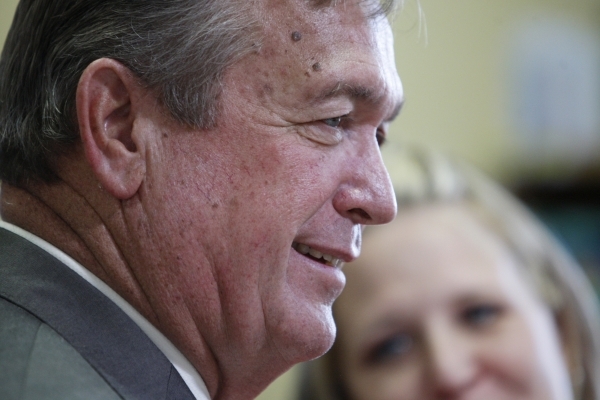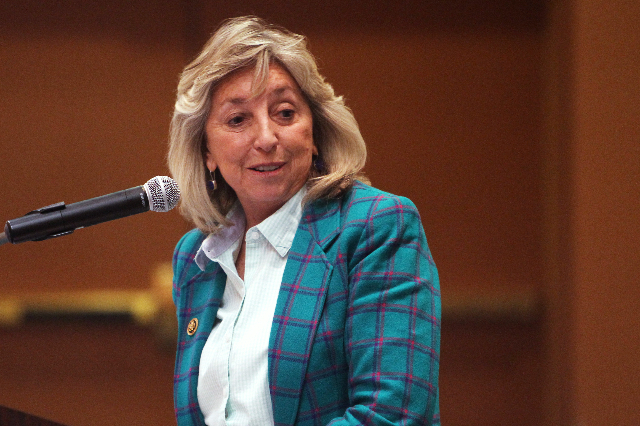PACs ramp up spending in Nevada congressional races
Political action groups have already put a more than half a million dollars into the three congressional district races in Southern Nevada.
The campaign contributions are early indicators of candidates' key support base and who some of the largest political spenders in Nevada are putting their money on.
They are the lifeblood of a campaign that can make or break candidates, giving them the ability to print fliers, organize events and blitz voters with ads to get their messages out.
The candidates received $567,950 in total from political action committees and other organizations, including campaigns from other candidates. Players involved include the gaming industry, utilities and other special interest groups, according to Federal Election Commission reports.
Political organizations tied to both of Nevada's U.S. senators, Democrat Harry Reid and Republican Dean Heller, have also put money into the campaigns.
Incumbents running for re-election scored the highest: Republican Rep. Cresent Hardy in the 4th Congressional District led the pack with $325,300, and Democratic Rep. Dina Titus of the 1st Congressional District received $121,000, both of them from January through September.
On the other end of the spectrum are lesser-known candidates who haven't received anything from the PACs, which isn't unusual for primaries.
In the middle are newcomers to congressional campaigns who have name recognition from political posts elsewhere, such as the Nevada Legislature. Political action committees are starting to send money their way in advance of the June 14, 2016, primary. The general election will be Nov. 8.
Candidates who are largely unknown have little chance of getting substantial donations from political groups as the race continues unless they pick up support and surge in the polls, said Eric Herzik, head of the political science department at the University of Nevada, Reno.
"It's a vicious cycle," he said. "If you don't have any money it's 'How can I get my numbers up?' and if I can't get my numbers up, how do I get money?"
Here's a look at some of the political action committees and other groups putting money into Southern Nevada's congressional races:
3rd Congressional District
The difference is wide in the 3rd Congressional District, which includes Henderson, Boulder City and parts of Clark County south to Laughlin and west to California. The race is open, with incumbent Rep. Joe Heck, R-Nev., running for the seat of retiring Democratic U.S. Sen. Harry Reid.
Republican Michael Roberson, majority leader in the Nevada Senate, reported $58,000 from political groups, including $10,000 each from Caesars Entertainment Corporation PAC, NV Energy PAC and Heller Highwater PAC, Nevada GOP Sen. Dean Heller's leadership PAC.
That's 13 percent of all Roberson's donations, which total $443,788.
Of the other candidates in the race, only one other Republican, sports facility owner Danny Tarkanian, got any money from political action groups. In Tarkanian's case, the slice was smaller: $1,000 from Caesars Entertainment Corporation PAC. That's less than 1 percent of his $357,295 total.
It's a common practice for gaming groups to hedge their bets and spread around donations, but not equally.
"Gaming often gives to both sides, but you can tell who they think is going to win," Herzik said.
Herzik also said the Nevada races will be marked by conflict between the establishment and tea party factions of the Republican Party.
While some groups donate heavily in the early months, Herzik said that won't necessarily scare off others who are campaigning as anti-establishment candidates.
"They think they can do it on a shoestring," he said, describing their mindset. "They're fighting the good fight and the people are with them."
Other Republican candidates who haven't received any political action committee funding in the race are Andrew Matthews, former president of the conservative think tank Nevada Policy Research Institute, and Annette Teijeiro, a physician. Matthews received $135,867 in donations from individual contributors, while Teijeiro received $10,831 from individual donations.
Democratic candidate Jesse Sbaih, an attorney, hasn't received anything from political groups either. His campaign's haul of about $300,000 includes $200,000 of the candidate's own money and $98,432 in individual contributions.
FEC filings don't show donations of any kind yet for Democrat Barry Michaels, who declared himself a candidate in August.
"You've got some highly recognized names and a number of them not so much," said Fred Lokken, a political science professor at the Truckee Meadows Community College in Reno. "They're going with what they see is the likely winner, which becomes a self-fulfilling prophecy."
4th Congressional District
Hardy has the advantage in support from political action committees. He has received $325,300 from political groups, nearly equal to the $348,347 he has received in individual donations.
He received $13,000 this year from Freedom Project PAC, $3,000 of which goes toward his 2014 campaign debt. The group, chaired by Republican House Speaker John Boehner, is aimed at aiding GOP candidates.
Other $10,000 givers include the Bluegrass Committee PAC, which promotes Republican leaders, and Heller Highwater PAC. Heller does not face an election in 2016.
The district stretches across six rural counties and North Las Vegas. Voters in this district elected Hardy to his first term in the 2014 elections, when a red Republican wave that gave the GOP victories across Nevada.
Hardy won by less than 4,000 votes, beating incumbent Democrat Steven Horsford. Democrats hope to regain the seat in 2016, and political groups are spreading the dollars among the Democratic challengers.
State Sen. Ruben Kihuen is leading the Democratic pack in support from political action groups.
Reid's political group is putting money into the race, too. Endorsed by Reid, Kihuen has received $10,000 from the Nevada Democrat senator's leadership PAC, called the Searchlight Leadership Fund.
That's his top donor among political groups. He has received $34,250 from political groups, almost 10 percent of his total of nearly $365,000.
Lucy Flores, a former state assemblywoman, has received $20,900 from political groups, or 11.5 percent of about $181,388 total donations. Top political donors to Flores include Latino Leaders for Equality, Growth, Opportunity, Progressive Action & Change PAC, $2,700, and Planned Parenthood Action Fund Inc. PAC, $2,500.
It's far less for the other Democrats: Susie Lee, a philanthropist, has received $5,750, a sliver of the $664,745 that has gone into her campaign. That total includes $100,000 in loans from the candidate.
Democrat John Oceguera, former Nevada Assembly speaker, has received $1,750, almost 1 percent of $180,844 of his campaign's receipts. That total includes a $50,005 loan from the candidate.
1st Congressional District
Political action committees aren't putting any money yet into the campaign of Republican opponent Mary Perry, who is challenging incumbent Democrat Rep. Dina Titus in the 1st District.
Titus carried the urban Las Vegas district in 2014 with nearly 57 percent of the vote. The race is less competitive here, where the number of registered Democrats is more than double the registered Republican voters.
Since Jan. 1, Titus has received $121,000 from political action committees, which is almost 40 percent of $307,040 in contributions. Top givers include Employees of Northrop Grumman Corporation Political Action Committee, and NV Energy Political Action Committee, which have each given $6,000.
Perry, an attorney who filed paperwork to run on Aug. 26, has loaned her campaign $1,600 and reported no contributions in the filing period, which ended Sept. 30.
Contact Ben Botkin at bbotkin@reviewjournal.com or 702-387-2904. Find him on Twitter: @BenBotkin1























